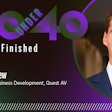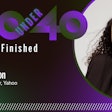Renowned documentary filmmaker Brett Culp got his start filming weddings. He was fascinated by unplanned, authentic moments. “It developed my mentality as a filmmaker,” he says. “I wasn’t drawn to scripted narratives with actors. I was drawn to environments with real people, where you never quite knew what was going to happen as the camera was rolling.”
As his documentaries grew in popularity and were featured on Hulu, Netflix and iTunes, Culp’s inbox was flooded with inspirational stories. Culp realized the stories he shared with his family over dinner were all centered on the theme of hope. In a world that feels like it’s getting darker and more hopeless, Brett found himself confronted with questions, such as, “What is hope really about? How do people lose it? And how do they get it back?”
His most recent film, “Look to the Sky,” spotlights heroic young people who faced life-threatening situations, homelessness, physical challenges and loss.
His ponderings and films have made him an inspirational keynote, sharing stories of hope and heroic leadership. Culp will be speaking at the Speaker Showcase at Connect 2019 on Tuesday, Aug. 27 from 1:15-1:45 p.m. Here’s a sneak peek of what attendees can expect.
When you think of leadership, “hope” is not usually the first word that comes to mind. What does hope have to do with leadership?
Napoleon said that leaders are dealers in hope. True visionary leaders always have a broader, wider scope of what we’re trying to accomplish. That’s what separates leaders from managers—the ability to paint a positive possibility of what could be and then invite people to join them in that space and take ownership to bring that positive vision to life through their talents and skills. At the core of their life philosophy, all great leaders have some measure of hopefulness and believe that positive change is possible and that we can do it together.
Have you noticed a pattern in why people lose hope and how they get it back?
Hope versus despair is not about how we see the past and present, but about how we see the future. As we get older, we start to see patterns of darkness in ourselves and in the world, and we begin to think if this is the way it’s been in my life for 40 to 50 years, then it will always be this way. If you believe the future is going to be exactly the same as it’s been up until now, and that you’re powerless to do anything to change it, then you’re going to feel despair.
Hope, however, defines identity by possibility, not current reality. When leaders shift their perspective and define a situation not by what happened last year, last month or for the past 10 years but by what can be, it is the most beautiful and inspiring gift they can give. Hope is one of the most powerful, life-changing, unbeatable and unstoppable forces that we have at our disposal and all it takes is a shift in our mentality.
How does failure play into this?
There are many clichés like “There is no failure; you’re just learning.” You can say that, but how you emotionally and spiritually experience it is very different. I view failure as the acknowledgment of my humanity. I’m not a computer or a robot, but a living breathing person with frailty and vulnerability. Those same vulnerabilities that cause us to make mistakes are also growth opportunities. You can’t have one without the other, just like you can’t have happiness without sadness. You can’t have growth without the possibility, that along the way, you’ll make mistakes.
Boris Karloff was one of the most famous actors of the golden age of Hollywood. He starred in 80 roles, and all of them were terrible and forgettable, but his 81st role was Frankenstein and it made his career. That’s how overnight success usually works. There’s not a stand-up comic that will not tell you that it took at least 10 years to become good at the craft. They sat in nightclubs, hoping for a chance to stand on a stage and bomb night after night until they finally figured it out. They were fully aware that failure was interlinked with growth; they couldn’t be separated.
What’s your pet peeve about leaders?
Too many leaders are more focused on control rather than empowerment. Great leaders don’t create a singular vision and expect everyone to live up to it; they empower people to bring their own talents and abilities. The most innovative leaders allow others to take ownership and lead the way in their own thing.
What’s one thing you want our audience to know?
We may think heroic leaders are those who have one shining moment of excellence. And in that singular moment, the whole world applauds them. In truth, great leaders over time, in small unrecognized moments, in words, in tiny actions and late nights no one sees, do the hard work of leadership over and over again. That’s what it truly is to be a hero in the world. Not that singular moment of explosion, but a light that shines through the darkness for decades.














